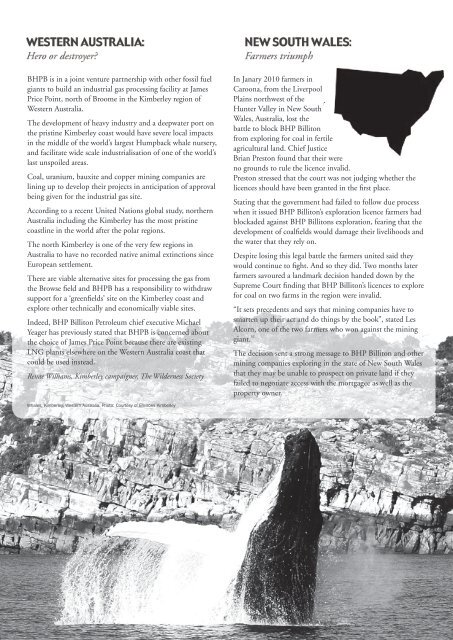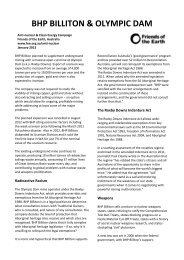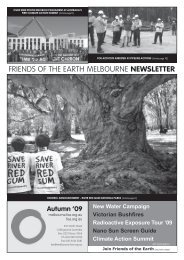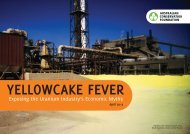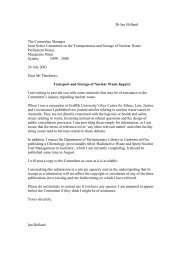2010 - BHP Billiton Watch
2010 - BHP Billiton Watch
2010 - BHP Billiton Watch
- No tags were found...
You also want an ePaper? Increase the reach of your titles
YUMPU automatically turns print PDFs into web optimized ePapers that Google loves.
<strong>BHP</strong>B is in a joint venture partnership with other fossil fuelgiants to build an industrial gas processing facility at JamesPrice Point, north of Broome in the Kimberley region ofWestern Australia.The development of heavy industry and a deepwater port onthe pristine Kimberley coast would have severe local impactsin the middle of the world’s largest Humpback whale nursery,and facilitate wide scale industrialisation of one of the world’slast unspoiled areas.Coal, uranium, bauxite and copper mining companies arelining up to develop their projects in anticipation of approvalbeing given for the industrial gas site.According to a recent United Nations global study, northernAustralia including the Kimberley has the most pristinecoastline in the world after the polar regions.The north Kimberley is one of the very few regions inAustralia to have no recorded native animal extinctions sinceEuropean settlement.There are viable alternative sites for processing the gas fromthe Browse field and <strong>BHP</strong>B has a responsibility to withdrawsupport for a ‘greenfields’ site on the Kimberley coast andexplore other technically and economically viable sites.Indeed, <strong>BHP</strong> <strong>Billiton</strong> Petroleum chief executive MichaelYeager has previously stated that <strong>BHP</strong>B is concerned aboutthe choice of James Price Point because there are existingLNG plants elsewhere on the Western Australia coast thatcould be used instead.Renae Williams, Kimberley campaigner, The Wilderness SocietyIn Janary <strong>2010</strong> farmers inCaroona, from the LiverpoolPlains northwest of theHunter Valley in New SouthWales, Australia, lost thebattle to block <strong>BHP</strong> <strong>Billiton</strong>from exploring for coal in fertileagricultural land. Chief JusticeBrian Preston found that their wereno grounds to rule the licence invalid.Preston stressed that the court was not judging whether thelicences should have been granted in the first place.Stating that the government had failed to follow due processwhen it issued <strong>BHP</strong> <strong>Billiton</strong>’s exploration licence farmers hadblockaded against <strong>BHP</strong> <strong>Billiton</strong>s exploration, fearing that thedevelopment of coalfields would damage their livelihoods andthe water that they rely on.Despite losing this legal battle the farmers united said theywould continue to fight. And so they did. Two months laterfarmers savoured a landmark decision handed down by theSupreme Court finding that <strong>BHP</strong> <strong>Billiton</strong>’s licences to explorefor coal on two farms in the region were invalid.“It sets precedents and says that mining companies have tosmarten up their act and do things by the book”, stated LesAlcorn, one of the two farmers who won against the mininggiant. 52The decision sent a strong message to <strong>BHP</strong> <strong>Billiton</strong> and othermining companies exploring in the state of New South Walesthat they may be unable to prospect on private land if theyfailed to negotiate access with the mortgagee as well as theproperty owner.Whales, Kimberley, Western Australia. Photo: Courtesy of Environs Kimberley| 20 |


